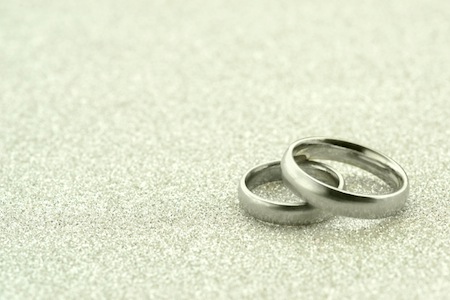Emily Heist Moss surprised herself when she was overcome with emotion at two recent weddings. She shares how her skepticism about marriage might be waning.
If you start with divorced parents, throw in an education heavy on the historical oppression of women, add a media diet laced with feminism and studded with contemporary examples of gendered bullshit, and stir well, there’s a good chance you’ll produce a marriage skeptic. At least, those were the key ingredients in the creation of my own personal brand of skepticism toward the wedding industrial complex.
A true skeptic expresses an “attitude of doubt or a disposition to incredulity toward a particular object,” which neatly sums up my feelings about the institution of marriage. It’s not that I categorically “don’t believe in marriage,” as you’ll hear certain classes of feminists and progressives declare, it’s that I’m perched on the fence with doubt and incredulity on one shoulder and hope and optimism on the other. It seems rather insane to me to put so much pressure on this tradition—how many people consider themselves, or are considered by others, incomplete if they’re not married?—when more than half of marriages end in divorce. I’m not saying I don’t buy it, I’m just saying I’m not sold yet.
That skepticism is fairly uninformed, however, given that at 25, I’m only just beginning to watch my peers embark on this particular adventure. With two weddings on back-to-back weekends, a slow thaw seems to be melting my icy heart. I’m not about to sing the praises of this ancient ritual yet, but let’s just say my position is evolving.
*****
In a perfect 21st century platonic fairytale, last week I watched two people get married who, up until that moment in the magistrate’s office in Iowa City, I had never met before. It’s a story as old as time… er… as old as Facebook, and it began as all great friendships do, with a few comments between bloggers. From comments we moved to shout-outs, from shout-outs to Facebook friendship, from Facebook we took the leap to gchat. And then one day, a year after we had first Internet-met, one half of this couple chatted me to ask a favor: Would I drive to Iowa and witness their legal wedding ceremony? How often was I going to get an invitation like that? So, after five hours across flat Midwestern cornfields, I signed on a line as these two amazing women legally committed themselves to each other. I may have cried.
But that was only the first of the two weddings in my recent history. Back in the old days, before “blog” was accepted by the Oxford English Dictionary, lifelong friendships usually began in kindergarten over crayon collaboration and swingset arguments. One of those friends, the oldest of the old, got married four days ago to her boyfriend of six years in a beautiful outdoor ceremony. I was the maid of honor, and every photo of me will be decorated by smeary mascara-laden tear tracks or a tidal wave of snot that I unsuccessfully tried to contain.
The overwhelming waves of emotion at both of these weddings caught me by surprise; when faced with the ritual itself, and not just the rhetoric surrounding it, something clearly tramples my skeptical impulses. In the week that’s followed, I’ve been doing some soul searching, experimenting with worldviews that reconcile my concerns about marriage (as a historical institution that oppresses and as a contemporary institution that excludes), with how overwhelmingly joyful I felt on both occasions.
One of the great victories of third wave feminism, in my opinion, is recognizing that intentional, informed personal choices are what it’s all about. I’m not talking about choices compelled by lack of options (“I got time off for the baby, my husband didn’t, so by default I became the caretaker”), or choices that conform because conformity is the easiest path (“Everyone gave me shit for not changing my last name”), or choices that seek to dictate other women’s choices (“I can afford birth control without insurance, so you should be able to too”), but true, un-coerced personal decision-making.
What greater example is there of that than the reclaiming of marriage as not something you should do, not something you’re supposed to do, not something that everybody eventually does, but something you want to do exactly when you want to do it and exactly how you want to do it?
*****
Neither of these couples got married because they felt the state or their families or their peers pushing them to march down the aisle for the sake of tradition. In different ways, they were both forging their weddings and subsequent marriages into the shapes that most worked for them. When you reject the foregone conclusions of who will do what and how this partnership will function, and instead trust that you two will figure it out together, as a team, well damn… that’s pretty powerful. No wonder I got choked up!
Only once the day arrived for my oldest friend, and I was standing there holding a bouquet on the side of a hill in the Hudson valley, watching this epic, incredible thing happen before my very eyes, did I realize how brave they were. It wasn’t about the centuries of sexism, or the myriad ways that marriage is still, today, used to oppress women around the world. That’s big picture shit, worthy of our thought and consideration, but some other time. At that moment, the big picture was clearly dwarfed by something so very small, two people holding hands.
Role/Reboot regular contributor Emily Heist Moss is a New Englander in love with Chicago, where she works in a tech start-up. She blogs every day about gender, media, politics and sex at Rosie Says, and has written for Jezebel, The Frisky, The Huffington Post and The Good Men Project. Find her on Facebook and Twitter.
Related Links:

